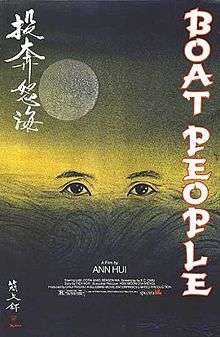Boat people (disambiguation)
The term boat people most often refers to the Vietnamese refugees who fled South Vietnam in 1978 and 1979 during and after its unsuccessful defense against the North in the Vietnam War.
Boat people may also refer to the following:
People
Other refugees fleeing by boat or ship:
Various ethnicities who live largely or principally on boats, particularly in East Asia:
Art
See also

Vietnamese boat people
Vietnamese boat people refers to refugees who fled Vietnam by boat and ship after the Vietnam War, especially during 1978 and 1979, but continuing until the early 1990s. The term is also often used generically to refer to all the Vietnamese (about 2 million) who left their country by any means between 1975 and 1995 (see Indochina refugee crisis). This article uses "boat people" to apply only to those who fled Vietnam by boat.
The number of boat people leaving Vietnam and arriving safely in another country totalled almost 800,000 between 1975 and 1995. Many of the refugees failed to survive the passage, facing danger and hardship from pirates, over-crowded boats, and storms. The boat people's first destinations were the Southeast Asian countries of Hong Kong (then a British crown colony), Indonesia, Malaysia, Philippines, Singapore and Thailand. In 1994-5, economic sanctions that had been imposed on Vietnam by the United States and a number of other countries were lifted, and Vietnam was re-admitted to the Association of Southeast Asian Nations. After sanctions were lifted, the number of refugees declined drastically as a result.

Boat People (film)
Boat People (Chinese: 投奔怒海; pinyin: Tóubēn Nù Hăi; Cantonese Yale: Tau ban no hoi; literally: "Into the Raging Sea") is a Hong Kong film directed by Ann Hui, first shown in theatres in 1982. The film stars George Lam, Andy Lau, Cora Miao, and Season Ma. At the second Hong Kong Film Awards, Boat People won awards for Best Picture, Best Director, Best New Performer, Best Screenplay, and Best Art Direction. It was also screened out of competition at the 1983 Cannes Film Festival. In 2005, at the 24th Hong Kong Film Awards, Boat People was ranked 8th in the list of 103 best Chinese-language films in the past 100 years.
Boat People was the last film in Hui's "Vietnam trilogy". It recounts the plight of the Vietnamese people after the communist takeover following the Fall of Saigon ending the Vietnam War.
Production
In the late 1970s, a great number of Vietnamese refugees flooded Hong Kong. In 1979, Hui was making the documentary A Boy from Vietnam for the RTHK network. In the process of making the film, she collected many interviews conducted with Vietnamese refugees about life in Vietnam following the Fall of Saigon. From these interviews, she directed The Story of Woo Viet (1981) starring Chow Yun-fat as Woo Viet, a Vietnamese boat person in Hong Kong, and Boat People.

Tanka people
The Tankas (simplified Chinese: 疍家; traditional Chinese: 蜑家; pinyin: Dànjiā; Jyutping: daan6 gaa1) or boat people are an ethnic subgroup in Southern China who have traditionally lived on junks in coastal parts of Guangdong, Guangxi, Fujian, Hainan, and Zhejiang provinces, as well as Hong Kong and Macau. Though many now live onshore, some from the older generations still live on their narrow boats and pursue their traditional livelihood of fishing. Historically, the Tankas were considered to be outcasts. Since they were boat people who lived by the sea, they were sometimes referred to as "sea gypsies" by the Chinese and British. Tanka origins can be traced back to the native ethnic minorities of southern China who may have taken refuge on the sea and gradually assimilated into Han culture. However, Tanka have preserved many of their native traditions that are not found in Han Chinese culture.
A small number of Tankas also live in parts of Vietnam. There they are called Dan (Đàn) and are classified as a subgroup of the Ngái ethnicity.
Podcasts:

